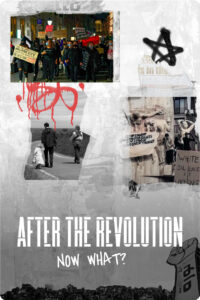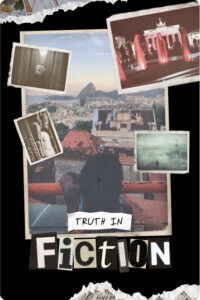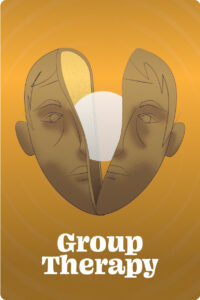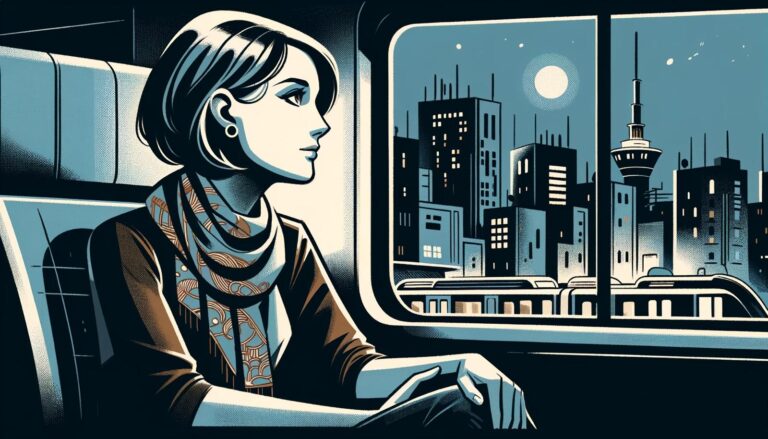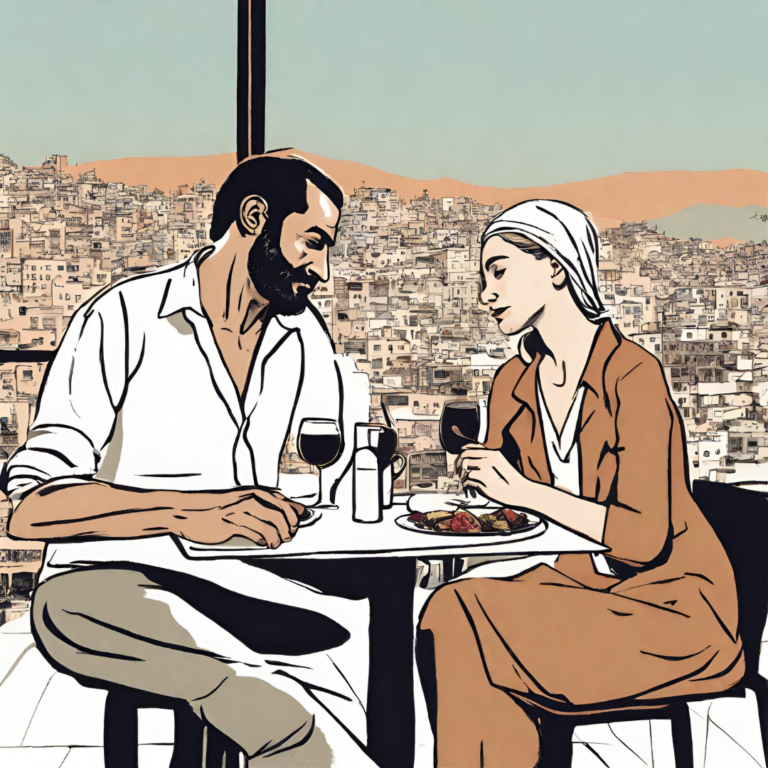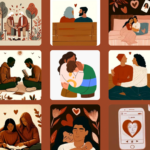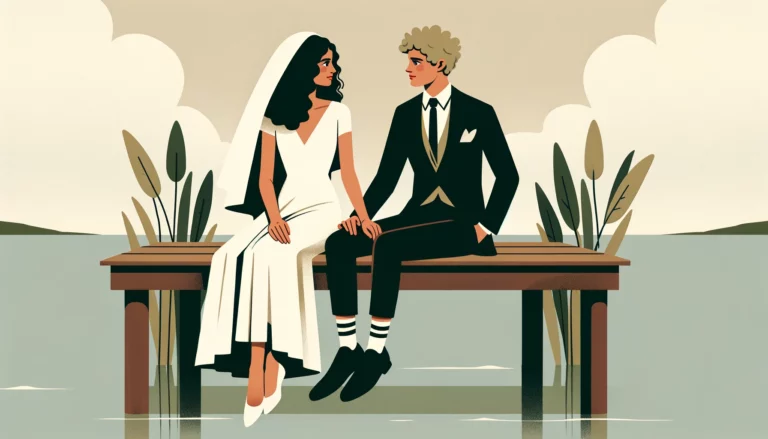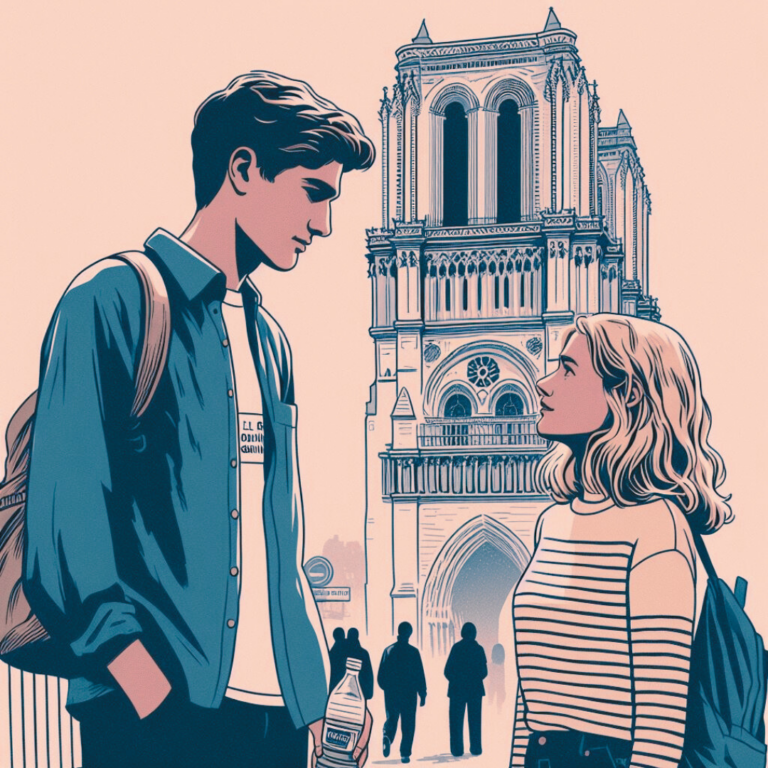What hurts most to never see again? A person or a place? A lover or a town? Flesh or mortar? I ask myself, mindlessly flipping a coin in this empty carriage carrying me through frosted meadows, the low afternoon light reflecting in turn on each side of the small golden disc: heads, tails, heads, tails.
Lulled by the smooth cradling motion of the train and the overheating that contrasts with the biting cold outside, I close my eyes and fall asleep. When I open them again I find myself in a different place, a city I felt in love with and lost.
Rewind:
The light swathing Damascus is a soft, duck egg blue. It might be dawn. I walk on disjointed pavement or smooth concrete, my steps echoing between the buildings around me. Perhaps I smell the dust brought in whirlwinds by the breeze that makes me shiver. I might hear the clamour of the city, see passing shadows or the seemingly familiar faces of the neighbourhood’s souls. Yet, I do not feel a thing.
My brother is with me this time, along with another friend. I am so happy to finally introduce them to Bakdash: we hurry through the covered streets of the souk, looking for a soft ice cream wrapped in its thick pistachio coat. “The iron roof seems to have been pierced by bullets,” I thought when I first visited the souk. “It turns the sun’s rays into a myriad of stars, giving everything -and everyone- a mythical appearance.” We turn left, then right, climb down stairs, pass past empty stalls or fountains. In a patchwork of badly-edited memories, time, place and people suddenly change. It is still dawn, but the breeze is cooler and people around us wear thick woollen clothes. The quest for ice cream is gone, and we now roam the streets for its winter alter ego: “Sorry Miss, we have run out of sahlab, come back tomorrow. We have some hot Milo instead, would you care to try it?” Fades out.
Another day. The sun is at its zenith now, and like a cat I bask in its warm embrace. My smile exudes the contentment and serenity of being home. As I walk down the narrow alleyways that wrinkle Mount Qassioun, my smile grows bigger and deeper. At last, I am back. This time I managed to get into Syria by crawling underneath a fence. The month before, I had sneaked in under the border control officer’s nose. Again and again I found myself unexpectedly in Damascus, like a stage character whose scene is about to begin. Set and…action.
In my dreams, Damascus is the city of my youth, the capital of exile. It is the agony of a love affair cut short at the height of its passion
Such is the power of dreams.
For I have dreamed of Damascus, once a week or so, for the past nine years. Endlessly, my mind has returned to the country where my body may no longer go. In the same way fingers can trace the face of a lost lover in the dark, I have wandered into the streets of my beloved city. I have even mapped my own version of it. And in this safe place in my mind, I can relive those golden times.
Sometimes, in my dreams, friends and family who did not have the chance to visit me when I lived there will join me. Finally, I can show them the side of me they know very little of. Can we forget the city of our student days? As time goes by, it becomes an idealised reconstruction of our youth. The playground for our adult self.
I barely come back to the places I lived in: my flat perched in the mountains like a bird’s nest, my school buried in the trees of Abu Rummaneh, my office by the Autostrad, my friends’ flats scattered around the city, my driving school on the road to the airport, the Rawda café where we watched the Euro Cup next to Parliament, the new and old cities clubs… No. The places I come back to are the figments of my imagination, loosely based on the city’s topography. I twist them at my leisure, drag them from scene to scene, dream after dream. I never know where I will stand, or how things will be when I start dreaming, but Damascus is always reassuring. Sometimes there are tensions lurking in the background, but for the most part the landscape is quiet, and subdued in this faded light.
At times the dreams become less frequent, but they always come back. In my dreams, Damascus is the city of my youth, the capital of exile. It is the agony of a love affair cut short at the height of its passion. Would I have grown so attached to Damascus, had I been able to return? Probably. But in a more mature way, after experiencing both highs and lows together. Damascus, I would have loved you through thick and thin. But I only lived the “thick” with you.
Damascus, the city of my frustration and guilt. Frustration for not being able to go where my fancy takes me, a relatively privileged European passport holder who can roam most of the world freely for once barred even if I beg, cry, ask nicely, threaten, plead. Even if I really, really want to. Frustration in the face of an arbitrary travel ban I cannot know the reason of and challenge the legitimacy. Guilt for not honouring the promises I made to my long-term and day-long friends to come back. “You see, another foreigner who had a great time in Syria and left to continue her life back where she came from, her photo albums filled with people she will not deign giving copies to, let alone meet with again?” Guilt for being so helpless in the face of the tears and blood that have been pouring like a bursting dam over these sun-drenched lands. Guilt at last for suffering from such a benign ordeal when so many have lost far more than a young woman’s city crush.
For a decade or so Damascus has been haunting me. And the surprise occurrence during this mundane train journey of dreams long-subsided suddenly echoed a more recent, still raw feeling of exile. Brought by lost love. To put it simply as I emerge from sleep’s limbo, exile is the impossibility of returning to one’s home. The place, tangible or not, where we feel the most at ease, whether it is a location, a bygone era, someone we loved. Was it better than any other? Hard to say, but who cares? What matters is that we have been happy there, whether just passing through or spending most of our life.
In the same way losing a city can feel like a cursed love story, this lost place can be a person we no longer see. Or more precisely, a relationship we no longer have. Heads, tails, the coin is still in my hand, now lacklustre as the sun sets behind the blurry hedges we passed by. Exile is love denied, love emptied of its main characters. We sometimes go through it even as partners remain physically present. In that case exile takes the shape of different, immaterial rooms that lovers pace on their own, unable to bring walls down by our incapacity to voice -or truly hear- what really needs to be said.
Exile in love can also be an unfulfilled promise, that of a future that doesn’t come and becomes in its absence an obsession, forfeiting other sources of happiness. A missing piece one never had yet is needed to feel whole again. One can run thousands of miles, it will not get them closer by even an inch. We can wait years and the deadline will not appear nearer. Home as the mirage made unbearable by its potentiality. Unreachable, hanging at the mercy of the other who suddenly becomes both the source of misery and the key to unlock the mental prison in which we slid.
Exile can become physical, taking the shape of lodgings we stubbornly furnish and decorate to make up for solitude when, on top of things, we are left alone in a foreign land, asked to follow our loved one at times, forbidden from doing so at others. A feeling of being a precious object on a shelf, coveted, cherished, but utterly lifeless and cold, used then stored at leisure among all the other pretty decorations bought and placed to turn this empty house into a home. A metaphor for a grotesque farce, the simulacre of marital harmony.
Exile in this context may be self-imposed, when we start building our own individual home to regain a sense of identity, a wholesomeness lost to the unspoken tensions of love. Where we voluntarily banish ourselves from the other as a healing reaction, whether it is a personal hobby, landscapes or recipes we enjoy alone, songs they would not listen to. A retreat we slowly disappear to, quietly, long before the thunder of break-up arguments.
Bidding farewell to the one person we felt the most happy with, we slice our heart open, feebly taking comfort in the thought that leaving was an attempt to regain control over our destiny after what was felt as an unbearable wait
Only, when the relationship ends, does the magnitude of exile fully explode. Bidding farewell to the one person we felt the most happy with, we slice our heart open, feebly taking comfort in the thought that leaving was an attempt to regain control over our destiny after what was felt as an unbearable wait. No matter who brandishes the sword, the cut is sharp and its brutality stuns for it slays a love still beating with fresh bursts of blood. It aches. Aches. Aches. Gasps of fresh air from liberty found laced with the acidity of pain. How strange to feel exiled from whom represented our first real home after years of uprooting. But the lump of trauma past that had grown in the throat could not just be pierced by Cupid’s arrow and swallowed.
We may then bury this feeling of displacement into air miles and suitcases by rushing head bent to the other side of the world; the ache follows us like an angry wasp, no matter how far and fast we flee. And stings us hard when we have reached the tip of the furthest land ever to be found. Was it the suddenly shattered belief that running away would bring our loved one back to us, or rather us back to them? That this relationship that is our home would turn out to be gleaming in the horizon, like the end of a journey, the objective of our quest? But on these distant shores, only the setting sun blares back bluntly, almost sorry for being the sole participant to our welcome committee. Only once we stop running do we indeed realise what we have lost.
If only romantic love had turned into friendship, allowing us to revisit now and again like a tourist in their homeland. But sometimes the person with our home on their back, or our home with a human face disappears, suddenly nowhere to be seen, from now on abstaining from our lives. Absent, refusing to contemplate even the slightest form of contact. Deserting the fort we had foolishly expected them to hold, reducing us to wander in a sad, lonely exile.
Help us tell the world to you !
Frictions is launching its club : by supporting Frictions, you’ll be supporting a community of authors and journalists who tell the world through intimate stories!

Here, love lost fully takes on the appearance of exile without peers. Of a country disappeared without a diaspora to revive it, if only briefly through memories, with other torch-bearers. The jokes, endless lists of shared passions, walks and discussions, were home. A home only made possible by the presence of the other. The other as the essential component of an entire world connecting us to so many things and people -friends and in-laws- that defined who we were, not so much socially as intimately. A universe destroyed by a storm whose sole survivor we become, stranded on a raft, brushing with the tips of our fingers and heart the vestiges we hastily packed in our flight: a melody, an old birthday gift, an expression, a love note scribbled on the back on an envelope, a spare button from their coat or the heavy photo albums.
As the train’s speakers splutter my destination I gather what I removed from my bag when I sat and put on the table, untouched. A heavy, dog-eared book, found at the back of a second-hand bookshop before boarding, falls on the floor, open at one of the last pages: ‘A lost cause will always win a last victory in men’s imaginations’ writes John Prebble as a conclusion to Culloden, a historical account of the 1746 Jacobite revolution culminating disastrously in the battle of the same name. An odd coincidence. In war and love alike, the lost home becomes idealised with time. Looking in the rear-mirror where it appears in an increasingly glorious light it prevents us from looking ahead. And so we take nostalgia’s risky road, sliding along the inevitable progression of time with our backs turned against the future. Far from fading, it even comes along as we go through life, offering imagined glimpses of what could have been, we who already sometimes stumble like headless ducks unsure of which direction to take.
If exile in its primary form is a collective ailment, the one associated with ending love is a solitary walk. An eternal, never-ending one at that, one we seem to bear until the rest of our days. Although, because it only concerns us, exile in love can eventually heal. And the empire we were expelled from slowly reclaimed, little by little, turning shared memories of the past into personal, serene landmarks for the present and future. This was me also, but now I stand, solidly, on my own two feet.

